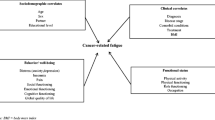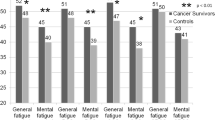Abstract
Purpose
Cancer-related fatigue (CRF) is one of the most frequently reported symptoms in cancer survivors. To be able to optimally treat CRF, knowledge of symptoms that interact with CRF is helpful. During aging, changes occur in body composition with progressive deterioration in physiological functions and metabolic processes causing a decline of adaptive capacity. Therefore, symptoms caused by cancer and its treatment might coexist in different symptom clusters in older cancer survivors, compared to younger survivors. The purpose of this analysis was to identify and compare symptom clusters that include CRF between older and younger survivors of colorectal cancer (CRC).
Methods
Data were drawn from a cross-sectional study from the Netherlands Cancer Registry. In total, 1698 stage I and II CRC survivors diagnosed from 2000 to 2009 completed questionnaires on fatigue and psychological distress. Survivors were categorized in two groups based on age (≤65 versus >65 years) Symptom clusters were assessed using principal component analysis. A sensitivity analysis was performed on the results with categorical principal component analysis.
Results
In both age groups, three components including two symptom clusters were identified: an emotional symptom cluster containing anxiety, fatigue, and depression; a pain symptom cluster containing pain and insomnia; and a third component containing dyspnea only.
Conclusions
Symptom clusters in survivors of CRC appear to be independent of age. In treating CRC survivors for fatigue, regardless of age, it is advisable to assess depression and anxiety and, if necessary, refer for further diagnosis and treatment.

Similar content being viewed by others
References
Bower JE (2014) Cancer-related fatigue—mechanisms, risk factors, and treatments. Nat Rev Clin Oncol 11:597–609. doi:10.1038/nrclinonc.2014.127
Berger AM, Mooney K, Alvarez-Perez A, Breitbart WS, Carpenter KM, Cella D, Cleeland C, Dotan E, Eisenberger MA, Escalante CP, Jacobsen PB, Jankowski C, LeBlanc T, Ligibel JA, Loggers ET, Mandrell B, Murphy BA, Palesh O, Pirl WF, Plaxe SC, Riba MB, Rugo HS, Salvador C, Wagner LI, Wagner-Johnston N, Zachariah FJ, Bergman MA, Smith C (2015) Cancer-related fatigue, version 2. J Natl Compr Cancer Netw 13(8):1012–39
Xiao C (2010) The state of science in the study of cancer symptom clusters. Eur J Oncol Nurs 14:417–434. doi:10.1016/j.ejon.2010.05.011
Miaskowski C, Aouizerat BE (2007) Is there a biological basis for the clustering of symptoms? Semin Oncol Nurs 23:99–105. doi:10.1016/j.soncn.2007.01.008
Koenig HG, Meador KG, Goli V, Shelp F, Cohen HJ, Blazer DG (1992) Self-rated depressive symptoms in medical inpatients: age and racial differences. Int J Psychiatry Med 22:11–31
Lyness JM, Cox C, Curry J, Conwell Y, King DA, Caine ED (1995) Older age and the underreporting of depressive symptoms. J Am Geriatr Soc 43:216–221
Cataldo JK, Paul S, Cooper B, Skerman H, Alexander K, Aouizerat B, Blackman V, Merriman J, Dunn L, Ritchie C, Yates P, Miaskowski C (2013) Differences in the symptom experience of older versus younger oncology outpatients: a cross-sectional study. BMC Cancer 13:6. doi:10.1186/1471-2407-13-6
Ritchie C, Dunn LB, Paul SM, Cooper BA, Skerman H, Merriman JD, Aouizerat B, Alexander K, Yates P, Cataldo J, Miaskowski C (2014) Differences in the symptom experience of older oncology outpatients. J Pain Symptom Manag 47:697–709. doi:10.1016/j.jpainsymman.2013.05.017
Yates PM, Miaskowski C, Cataldo JK, Paul SM, Cooper BA, Alexander K, Aouizerat B, Dunn L, Ritchie C, McCarthy A, Skerman H (2015) Differences in composition of symptom clusters between older and younger oncology patients. J Pain Symptom Manag 49:1025–1034
Cheung WY, Le LW, Gagliese L, Zimmermann C (2011) Age and gender differences in symptom intensity and symptom clusters among patients with metastatic cancer. Support Care Cancer 19:417–423. doi:10.1007/s00520-010-0865-2
van de Poll-Franse LV, Horevoorts N, Mv E, Denollet J, Roukema JA, Aaronson NK, Vingerhoets A, Coebergh JW, de Vries J, Essink-Bot M, Mols F, van Eenbergen M, Denollet J, Roukema JA, Aaronson NK, Vingerhoets A, Coebergh JW, de Vries J, Essink-Bot M, Mols F, Profiles Registry G (2011) The patient reported outcomes following initial treatment and long term evaluation of survivorship registry: scope, rationale and design of an infrastructure for the study of physical and psychosocial outcomes in cancer survivorship cohorts. Eur J Cancer 47:2188–2194. doi:10.1016/j.ejca.2011.04.034
van Duijn C (2002) Keij I. Sociaal economische status indicator op postcode niveau 50:32–35
UICC (2002) TNM classification of malignant tumours. Wiley and Blackwell Publishing, New Jersey
Sangha O, Stucki G, Liang MH, Fossel AH, Katz JN (2003) The self-administered comorbidity questionnaire: a new method to assess comorbidity for clinical and health services research. Arthritis Rheum 49:156–163
Michielsen HJ, Van dS, Roukema JA, De Vries J (2007) Personality and fatigue in patients with benign or malignant breast disease. Support Care Cancer 15:1067–1073. doi:10.1007/s00520-007-0222-2
De Vries J, Michielsen H, Van Heck GL, Drent M (2004) Measuring fatigue in sarcoidosis: the Fatigue Assessment Scale (FAS). Br J Health Psychol 9:279–291. doi: 10.1348/1359107041557048.
Michielsen HJ, De Vries J, Van Heck GL (2003) Psychometric qualities of a brief self-rated fatigue measure: the Fatigue Assessment Scale. J Psychosom Res 54:345–352. doi:10.1016/S0022-3999(02)00392-6
Luctkar-Flude M, Groll D, Woodend K, Tranmer J (2009) Fatigue and physical activity in older patients with cancer: a six-month follow-up study. Oncol Nurs Forum 36:194–202
Stone P, Richards M, A'Hern R, Hardy J (2000) A study to investigate the prevalence, severity and correlates of fatigue among patients with cancer in comparison with a control group of volunteers without cancer. Ann Oncol 11:561–567
Aaronson NK, Ahmedzai S, Bergman B, Bullinger M, Cull A, Duez NJ, Filiberti A, Fleishman FH, Rofe PB, Schraub S, Sneeuw KCA, Sullivan M, Takeda FA (1993) The European Organisation for Research and Treatment of Cancer QLQ-C30: a quality-of-life instrument for use in international clinical trials in oncology. J Natl Cancer Inst 85(5):365–376. doi:10.1093/jnci/85.5.365
Groenvold M, Klee MC, Ma S, Aaronson NK (1997) Validation of the EORTC QLQ-C30 quality of life questionnaire through combined qualitative and quantitative assessment of patient-observer agreement. J Clin Epidemiol 50:441–450. doi:10.1016/S0895-4356(96)00428-3
Cohen J (1977) Statistical power analysis for the behavioral sciences. Academic Press, US
Norman GR, Sloan JA, Wyrwich KW (2003) Interpretation of changes in health-related quality of life: the remarkable universality of half a standard deviation. Med Care 41:582–592
Bjelland I, Dahl AA, Haug TT, Neckelmann D (2002) The validity of the hospital anxiety and depression scale. J Psychosom Res 52:69–77. doi:10.1016/S0022-3999(01)00296-3
OlssÃn I, Mykletun A, Dahl AA (2005) The hospital anxiety and depression rating scale: a cross-sectional study of psychometrics and case finding abilities in general practice. BMC Psychiatry 5:46. doi:10.1186/1471-244X-5-46
Zigmond AS, Snaith RP (1983) The hospital anxiety and depression scale. Acta Psychiatr Scand 67:361–370
Castelli L, Binaschi L, Caldera P, Mussa A (2011) Torta R. Fast screening of depression in cancer patients: the effectiveness of the HADS 20:528–533. doi:10.1111/j.1365-2354.2010.01217.x
Kinnier CV, Asare EA, Mohanty S, Paruch JL, Rajaram R, Bilimoria KY (2014) Risk prediction tools in surgical oncology. J Surg Oncol 110:500–508. doi:10.1002/jso.23714
Stevens JP (2002) Applied multivariate statistics for the social sciences. Erlbau, Hillsdale
Patil VH, Singh SN, Mishra S, Todd Donavan D (2008) Efficient theory development and factor retention criteria: abandon the ‘eigenvalue greater than one’ criterion. J Bus Res 61:162–170. doi:10.1016/j.jbusres.2007.05.008
Jolliffe IT (2002) Principal component analysis. Springer-Verlag, New York
Ferguson E, Cox T (1993) Exploratory factor analysis: a Users’Guide 1:84–94. doi: 10.1111/j.1468-2389.1993.tb00092.x
Linting M, Meulman JJ, Groenen PJF, van der Koojj AJ (2007) Nonlinear principal components analysis: introduction and application. Psychol Methods 12:336–358. doi:10.1037/1082-989X.12.3.336
Anonymous (2015) Health statistics and information systems; Definition of an older or elderly person Proposed Working Definition of an Older Person in Africa for the MDS Project. In: World health Organization
Mols F, Lemmens V, Bosscha K, van den Broek W, Thong MSY (2014) Living with the physical and mental consequences of an ostomy: a study among 1-10-year rectal cancer survivors from the population-based PROFILES registry. Psychooncology 23:998–1004
Husson O, Mols F, van de Poll-Franse LV, Thong MSY (2015) The course of fatigue and its correlates in colorectal cancer survivors: a prospective cohort study of the PROFILES registry. Support Care Cancer 23:3361–3371
Cliff N (1983) Some cautions concerning the application of causal modeling methods. Multivariate Behav Res 18:115–126
Copay AG, Subach BR, Glassman SD, Polly DW Jr, Schuler TC (2007) Understanding the minimum clinically important difference: a review of concepts and methods. Spine J 7:541–546. doi:10.1016/j.spinee.2007.01.008
Travers J, Dudgeon DJ, Amjadi K, McBride I, Dillon K, Laveneziana P, Ofir D, Webb KA, O'Donnell DE (2008) Mechanisms of exertional dyspnea in patients with cancer. J Appl Physiol 104:57–66
Serra-Rexach JA, Jimenez AB, García-Alhambra MA, Pla R, Vidán M, Rodríguez P, Ortiz J, García-Alfonso P, Martín M (2012) Differences in the therapeutic approach to colorectal cancer in young and elderly patients. Oncologist 17:1277–1285
Brændegaard Winther S, Baatrup G, Pfeiffer P, Qvortrup C (2016) Trends in colorectal cancer in the elderly in Denmark, 1980-2012. Acta Oncol 55(Suppl 1):29–39
Berger AM, Mitchell SA, Jacobsen PB, Pirl WF (2015) Screening, evaluation, and management of cancer-related fatigue: ready for implementation to practice? CA Cancer J Clin 65:190–211
Author information
Authors and Affiliations
Corresponding author
Ethics declarations
Conflict of interest
The authors declare that they have no competing interests.
Financial disclosures
This research was supported by a grant from the Netherlands Organization for Scientific Research (NWO grant number 023.006.012).
Rights and permissions
About this article
Cite this article
Agasi-Idenburg, S.C., Thong, M.S.Y., Punt, C.J.A. et al. Comparison of symptom clusters associated with fatigue in older and younger survivors of colorectal cancer. Support Care Cancer 25, 625–632 (2017). https://doi.org/10.1007/s00520-016-3451-4
Received:
Accepted:
Published:
Issue Date:
DOI: https://doi.org/10.1007/s00520-016-3451-4




